If you have encountered a narcissist in love, work, or family, then you surely have experienced the dreaded silent treatment, a tactic used by psychological abusers (including extreme narcissists) to hold power and control in their relationships.
As written about extensively in the recent wave of articles on narcissistic abuse, an extreme narcissist is an individual, male or female, who targets other people for sources of narcissistic supply (or ego fuel) to fill their empty psychological voids.
Most always, an extreme (or malignant) narcissist will engage in such emotional abuse tactics as gaslighting, hoovering, love-bombing, and silent treatment, among others.
More specifically, in relationships with an extreme narcissist, the toxic partner (whether boss, lover, friend, or family member) seeks to consistently take the position of one-up in which they are always in control and in power.
Related: The No Contact Vs Silent Treatment: What’s The Difference?
When the narcissistic supply source (a supervisee, family member, lover, friend) is providing “good supply,” (or ego fuel) they are placating the whims of the narcissist, providing adulation, praise, attention, disgust, horror, or any type of reaction that makes the abuser appears to be powerful and important.
The extreme narcissist’s ego is soothed when sources of ego fuel are behaving appropriately, in the narcissist’s mind. It’s as if the extreme narcissistic were developmentally stunted at age five. Picture two children playing on a merry-go-round.
As long as the narcissist is being admired for his skill riding the prettiest, shiniest pony, the playmate will continue to be “privileged” with the presence of the narcissist.
However, as is inevitable in any type of relationship with an extreme narcissist, the target serving the role of narcissistic supply will ultimately fail to provide “good ego fuel.”
Sooner or later, the lover/partner/family member/supervisee tires of the energy drain connected with supplying the psychologically impoverished narcissist. In time, “good” suppliers of narcissistic supply disappoint or even create what experts call a narcissistic injury in the narcissist. The target sets a healthy limit, questions the intentions of the narcissist, or requests a compromise, all of which are healthy communication tools.
The narcissist, however, becomes enraged that his/her uniqueness is in question. Instead of taking constructive criticism, owning responsibility for his/her transgressions, and showing empathy for their ego supply source, the narcissist is incapable of compromise or any of the above healthy communication tools and instead lashes out at the mere suggestion of accommodating a healthy communication style.
The target failed to admire the narcissist’s pretty pony and cowboy style of riding on the merry-go-round.
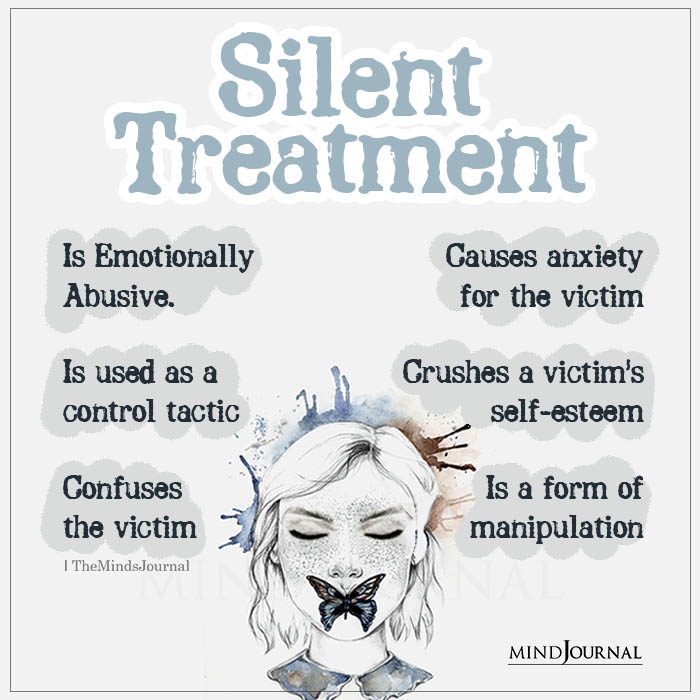
Enter the silent treatment.
What frequently ensues in the relationship cycle with a narcissist is the pattern of idealizing, devalue, discard. The narcissist’s ego cannot tolerate the idea that his core identity is not so important to his ego fuel source, such that others would question his omnipotence and entitlement.
Therefore, the extreme narcissist feels threatened that that target (who is like a mirror, reflecting back to the narcissist that he exists), is ceasing to provide adequate narcissistic supply. The narcissist’s very existence is threatened on a psychological level, to the point that he fears complete annihilation of his central core identity.
His ego is that fragile. The narcissist pouts, refuses to share his cowboy hat, jumps off the merry-go-round, and runs off to the jungle gym, leaving his playmate mystified and spinning alone, dizzy with confusion. No more narcissists. Gone. Poof. In the wink of an eye.
The deployment of the silent treatment is frankly one of the most sadistic, cruel, and immature forms of psychological abuse.
Related: Is the Narcissist’s Silent Treatment Abuse?
In order to usurp an albeit false sense of control and reclaim some stability of his fragile ego, the abuser suddenly cuts contact with the target. The extreme narcissist must reclaim control and power in the relationship, and the healthy boundary set by the target was unacceptable to the narcissist’s fragile ego.
At this point in the relationship cycle, the abuser will cease responding to phone calls, texts, emails, social media and seemingly vanish from thin air.
The narcissist will “ be gone” as a punishment to the target for daring to set a healthy limit or in response to a perceived criticism (which is often a request for compromise from the target). The abuser sadistically celebrates reclaiming complete control and power via the destruction of communication through silence.
The extreme narcissist can see his playmate from afar from his vantage point atop the jungle gym, a new throne for him. His playmate is spinning with nausea, confused and worried, fearful and afraid. Where did her friend go?
The target often suffers emotional evisceration through a sense of complete bewilderment and emotional pain, given that no opportunity for closure or clarification is made available by the narcissist. Oftentimes, the target is an individual with a high emotional IQ, possessing healthy conflict resolution skills, the very qualities an extreme narcissist does not contain within their fragile ego.
Extreme narcissists are incapable of accountability, compromise, empathy, reciprocity, and integrity. Since the target typically has been love-bombed or future-faked into believing that the narcissist was her knight-in-shining-armor or perfect boss, the target is often deeply confused and experiences the cognitive dissonance so common for survivors of narcissistic abuse.
The extreme narcissist has suddenly vanished into thin air, and such an abrupt Houdini act leaves the survivor reeling with shock, disbelief, and fairly horrific emotional pain. There is no opportunity for closure.
The survivor is forced to create her own closure unless or until her abuser circles around like a shark for a “hoover” (an attempt to re-engage prior sources of narcissistic supply). However, an extreme narcissist will never allow the opportunity for closure and will continue to extract narcissistic supply without any accountability to their prior transgressions.
Related: Responding To A Narcissist’s Silent Treatment
It’s as if the extreme narcissist feels so omnipotent that they can press a re-set button and avoid any responsibility for causing emotional harm. Some abusers will stay gone if they determine their source of narcissistic supply can see past the false mask the narcissist has carefully crafted. And in the end, no contact with a psychological abuser is healthy for a survivor.
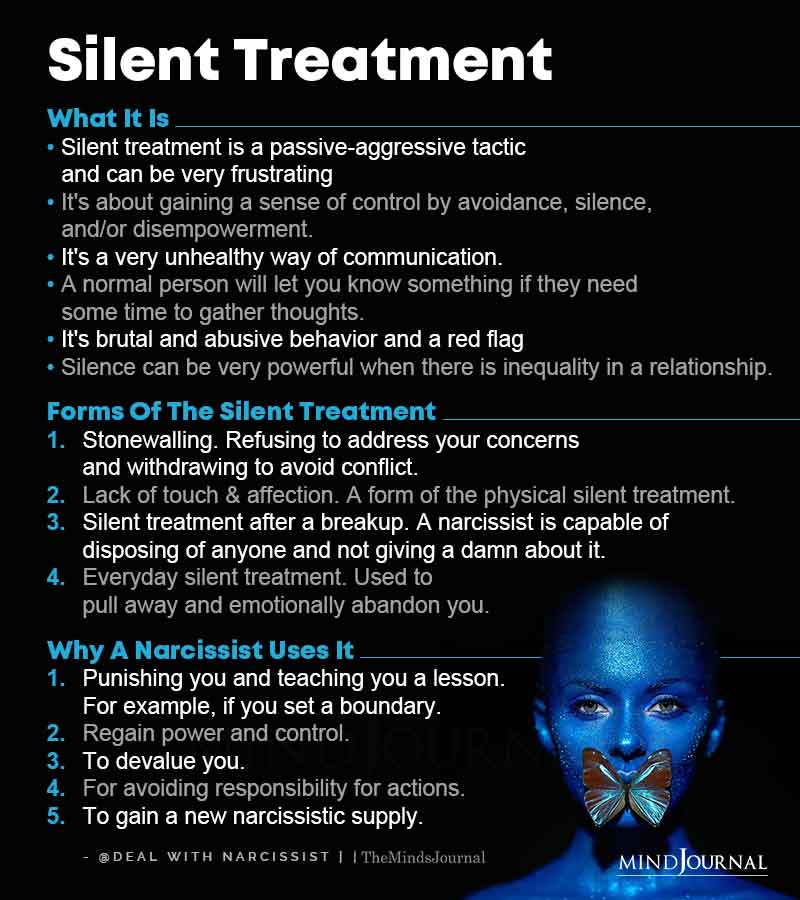
Survivor of the Silent Treatment
An essential first step for the survivor of the silent treatment is to get off the merry-go-round. Your head will spin for a while until it doesn’t. You will learn with No Contact that your playmate has chosen to be mean, cruel, and psychologically abusive. There will never be closure with an extreme narcissist, only pain when there is contact.
He can have his throne atop the jungle gym. But he can’t have you, your life energy, your empathy, authenticity, integrity, kindness, accountability, reciprocity, conflict management skills, compromise, and compassion.
Related: Here’s What A Narcissist’s Silent Treatment Actually Means
Your head will eventually stop spinning from the merry-go-round adventure in time. For now, you must connect with competent and compassionate psychological support from caring and informed helping professionals. Some support forums may be helpful. Read all you can about narcissistic abuse.
You can and will recover, even in the aftermath of emotional pain. As for the extreme narcissist, he is destined to be alone on his throne in the playground.
Want to know more about narcissists and their silent treatment? Check this video out below!
Follow her blog Andrea Schneider to read more.
Written By Andrea Schneider, MSW, LCSW Originally Appeared On Andrea Schneider, LCSW
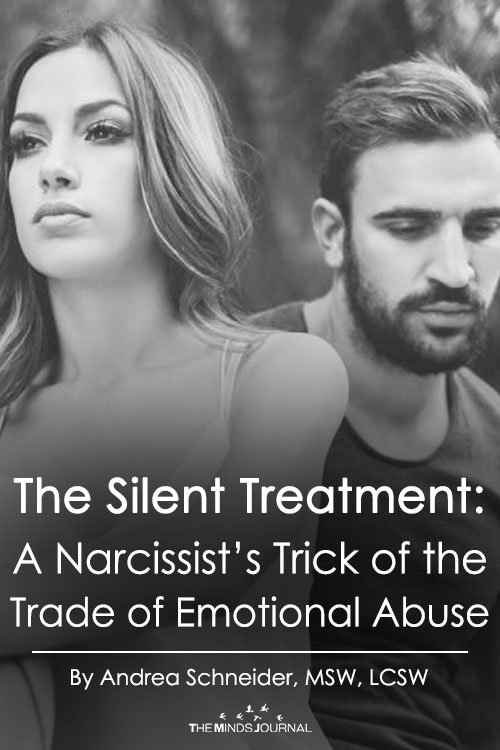

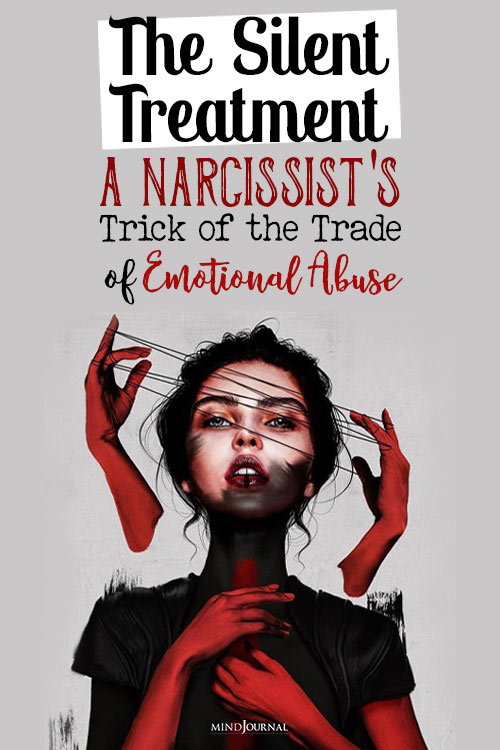
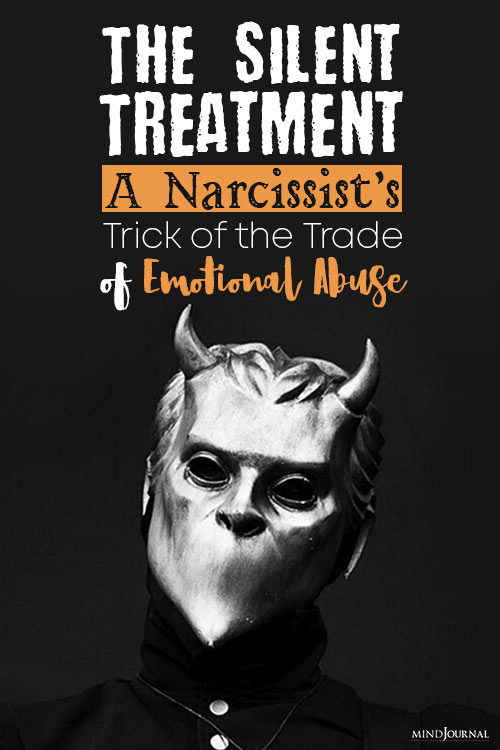
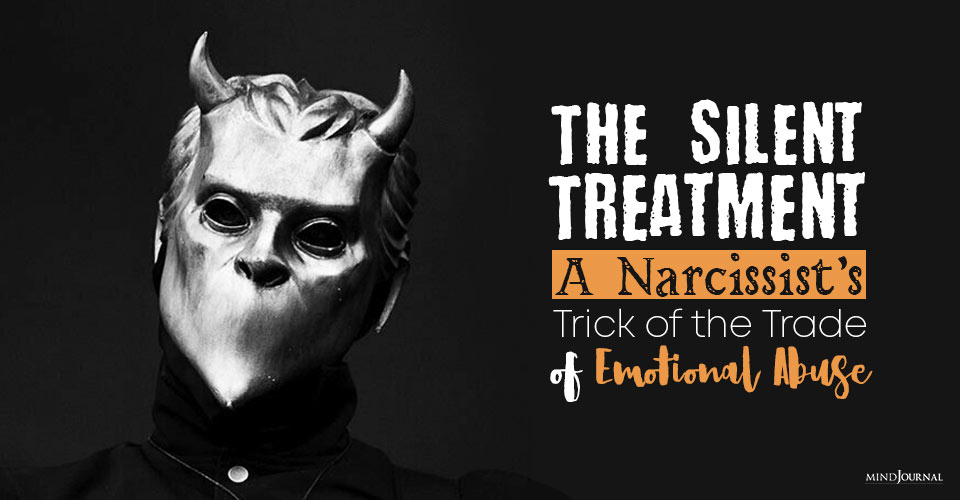







Leave a Reply
You must be logged in to post a comment.